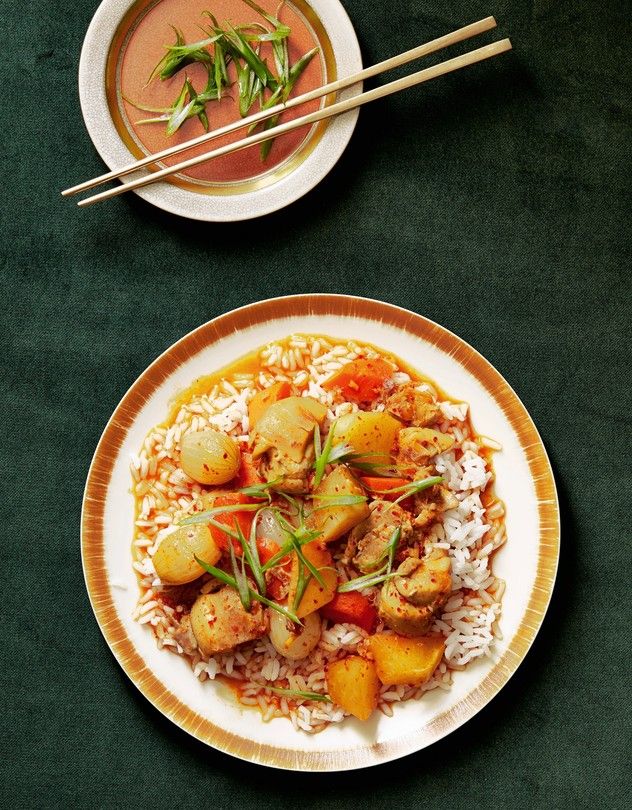
Hooni Kim’s Recipe for Spicy Braised Chicken With Root Vegetables
This warming braise from chef Hooni Kim of Manhattan’s Danji and Hanjan combines tender chicken with potatoes, kohlrabi and carrots in a broth laced with sake, ginger and Korean red pepper paste. The recipe is quick to prepare and all the more delicious reheated the next day
By
Kitty Greenwald
Feb. 20, 2015 10:00 a.m. ET

TIPSY TIP | Brewed from fermented rice, sake brings a complex flavor as well as a welcome note of acid to the braising liquid in this dish. Photo: Armando Rafael for The Wall Street Journal, Food Styling by Heather Meldrom, Prop Styling by Nidia Cueva
AT LEAST FOUR times a year, chef Hooni Kim visits Korea to pick up pantry staples for his restaurants in New York City. No matter what, the chef makes time to eat well too. “When I go to Korea, if I’m eating out, I just enjoy it,” he said. Even these informal meals, however, inevitably leave their mark. “Whenever I come home, I always recreate certain dishes,” Mr. Kim said. “I first made this one on a winter night. It was really cold out and I wanted to eat it right then.”
The Chef: Hooni Kim

Illustration: Michael Hoeweler
His restaurants: Danji and Hanjan, both in New York City
What He’s Known For: Deceptively simple, masterfully executed Korean cooking, both traditional and modern
A braise of browned chicken that simmers until tender along with winter root vegetables in a spicy broth, this one-pot meal, the chef’s third Slow Food Fast contribution, is a straightforward interpretation of a staple found all over Korea. “There are restaurants that only serve this dish,” Mr. Kim said.
No wonder. Though simple to prepare, it delivers a rich, round, multilayered flavor. The braising liquid combines chicken stock, sake, sugar, red pepper paste, red pepper flakes and soy sauce. “When something is spicy,” Mr. Kim explained, “Korean cooks balance it out with acid, sweetness and saltiness.”
For best results, Mr. Kim recommends letting the dish rest before serving—overnight, if possible. “If you make this in advance and then reheat it, the sauce thickens because of the starch from the potatoes,” he said. And that’s the beauty of this recipe: You could easily throw it together after work on a weeknight, but with a little prep the night before, you could come in from the cold knowing a warming, made-from-scratch meal will be on the table in minutes.
Spicy Braised Chicken With Root Vegetables
Total Time: 35 minutes Serves: 4
- 2½ pounds boneless chicken thighs, cut into bite-size pieces
- Salt and freshly ground black pepper
- 2 tablespoons vegetable oil
- 2 medium Yukon Gold potatoes, cut into bite-size pieces
- 2 medium carrots, cut into bite-size pieces
- 2 small kohlrabi, peeled and cut into bite-size pieces
- 1 medium yellow onion, cut into bite-size wedges
- 1 tablespoon minced garlic
- 1 teaspoon minced fresh ginger
- 1 cup sake
- 2 cups chicken stock
- 3 tablespoons gochujang (Korean red pepper paste)
- 1 tablespoon red pepper flakes
- 2 tablespoons soy sauce
- 1 tablespoon sugar
- Thinly sliced scallions, for garnish (optional)
- Cooked white rice, for serving (optional)
1. Season chicken with salt and pepper. Set a large Dutch oven over medium-high heat. Once hot, add oil, then lay in chicken, skin-side down. Sear until golden brown, 5 minutes per side. Remove from pot and set aside.
2. Stir potatoes, carrots, kohlrabi, onions, garlic and ginger into pot. Add sake, increase heat to high and cook, scraping up brown bits from bottom of pot, until alcohol burns off, about 4 minutes. Stir in stock, gochujang, red pepper flakes, soy sauce and sugar. Bring to a simmer, then reduce heat to medium.
3. Return chicken to pot. Continue to simmer until chicken is cooked through and vegetables are very tender, about 15 minutes more. Garnish with scallions, if you like. Serve alone or with white rice.
